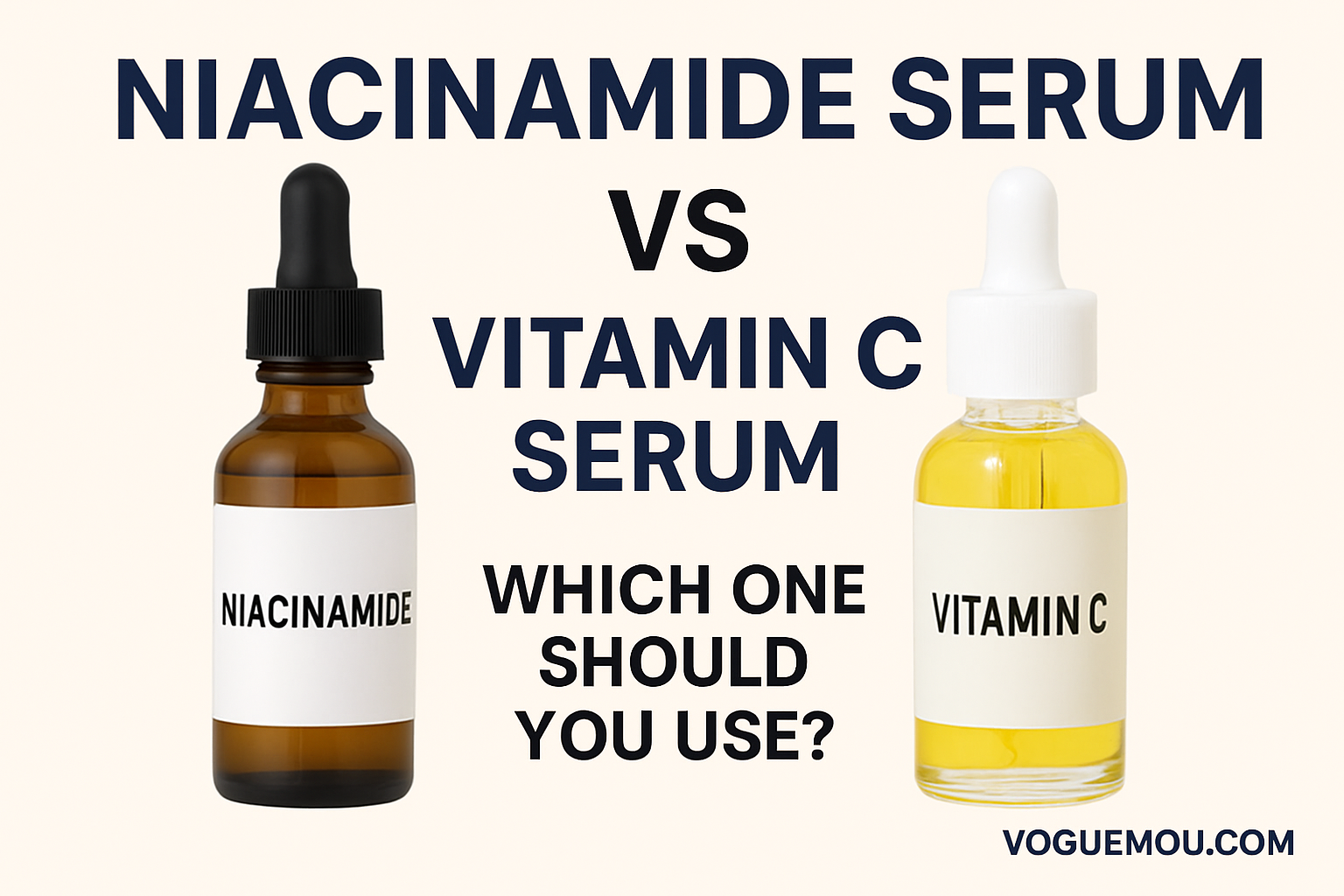When it comes to brightening skin, reducing dark spots, and improving overall complexion, Niacinamide and Vitamin C are two of the most popular skincare ingredients. Both offer powerful benefits, but they work differently. Understanding how each ingredient functions can help you choose the best option for your skin — or even decide if you should use both together.
What Is Niacinamide?
Niacinamide, also known as Vitamin B3, is a gentle, water-soluble ingredient suitable for almost all skin types. It’s known for its calming and repairing properties.
Key Benefits of Niacinamide
-
Reduces inflammation: Helps calm redness, irritation, acne, and rosacea-prone skin.
-
Minimizes pores: Regulates oil production and tightens enlarged pores.
-
Strengthens skin barrier: Helps skin retain moisture.
-
Improves uneven tone: Fades dark spots and hyperpigmentation gradually.
-
Suitable for sensitive skin: Very stable and non-irritating.
What Is Vitamin C?
Vitamin C, especially in the form of L-ascorbic acid, is a strong antioxidant that brightens the skin and protects it from environmental damage.
Key Benefits of Vitamin C
-
Brightens skin: Boosts radiance and reduces dullness.
-
Fades hyperpigmentation: Works faster on dark spots than many other ingredients.
-
Boosts collagen production: Helps reduce fine lines and maintain firmness.
-
Protects from free radicals: Shields your skin from sun damage and pollution.
-
Enhances sunscreen performance: Vitamin C + SPF offers stronger UV protection.
Niacinamide vs Vitamin C: Key Differences
| Feature | Niacinamide | Vitamin C |
|---|---|---|
| Strength | Mild to moderate | Strong and fast-acting |
| Best For | Sensitive, oily, acne-prone skin | Dull, uneven, aging skin |
| Irritation Risk | Very low | Moderate (tingling/burning possible) |
| Stability | Very stable | Unstable if exposed to light/air |
| Primary Benefits | Redness relief, barrier repair, pore care | Brightening, collagen boost, pigmentation removal |
Can You Use Niacinamide and Vitamin C Together?
Yes — modern formulations allow them to be used together safely.
Older studies suggested they neutralize each other, but that only happens under extreme heat. Today’s skincare products are stable enough for layering both ingredients.
How to Use Them Together
-
Morning: Vitamin C (for antioxidant protection) → Moisturizer → Sunscreen
-
Night: Niacinamide (to calm, repair, and strengthen skin)
Or you can apply Vitamin C first, then Niacinamide, especially if both are serums.
Which One Should You Choose?
Choose Niacinamide if:
-
You have sensitive skin
-
You deal with redness, irritation, or acne
-
You want pore tightening and oil control
-
You want a gentle ingredient for daily use
Choose Vitamin C if:
-
Your main goal is brightening and reducing dark spots
-
You want to fight fine lines and early aging
-
Your skin is not very sensitive
-
You prefer fast results
Use Both If:
-
You want a complete brightening + strengthening routine
-
You need extra protection during the day
-
You want both short-term brightness and long-term skin health
FAQs
1. Can I use Niacinamide and Vitamin C at the same time?
Yes. Modern formulas are stable, and both ingredients can be layered safely. Apply Vitamin C first, then Niacinamide, or use Vitamin C in the morning and Niacinamide at night.
2. Should I use Niacinamide or Vitamin C first?
If layering, use Vitamin C first because it absorbs better at a lower pH. Follow with Niacinamide to calm and strengthen the skin barrier.
3. Is Niacinamide or Vitamin C better for dark spots?
Vitamin C works faster for brightening and treating hyperpigmentation. Niacinamide helps too but works more gradually.
4. Which is better for sensitive skin?
Niacinamide is the better choice. It’s soothing, gentle, and rarely causes irritation, unlike Vitamin C which can sting sensitive skin.
5. Do I need sunscreen when using Vitamin C?
Yes. Vitamin C increases sun sensitivity and works best when paired with sunscreen for maximum protection and results.
6. Can oily or acne-prone skin use both?
Absolutely. Niacinamide controls oil and reduces redness, while Vitamin C helps heal marks and brighten skin tone.
7. Is it safe to use them daily?
Yes. Both can be used daily unless your skin becomes irritated. Start slowly if you’re new to Vitamin C.
Comparison
| Feature | Niacinamide Serum | Vitamin C Serum |
|---|---|---|
| Skin Benefits | Calms redness, reduces pores, regulates oil | Brightens skin, fades dark spots, boosts collagen |
| Best For | Sensitive, oily, acne-prone skin | Dull, uneven, aging skin |
| Irritation Level | Very low, gentle | Can cause tingling or irritation |
| Stability | Very stable | Unstable; oxidizes easily |
| Speed of Results | Gradual improvements | Fast brightening effect |
| Usage | Anytime (AM/PM) | Best in the morning with SPF |
| Compatibility | Works well with most ingredients | Avoid mixing with strong acids |
Final Verdict
Both Niacinamide and Vitamin C are excellent skincare ingredients, each offering unique benefits. If your goal is gentle repair, pore tightening, or calming irritated skin, Niacinamide is ideal. If you want brighter, firmer, and more youthful-looking skin, Vitamin C is the stronger choice.
Using them together can give you a powerful, balanced skincare routine that enhances glow, reduces dark spots, and strengthens your skin barrier.

